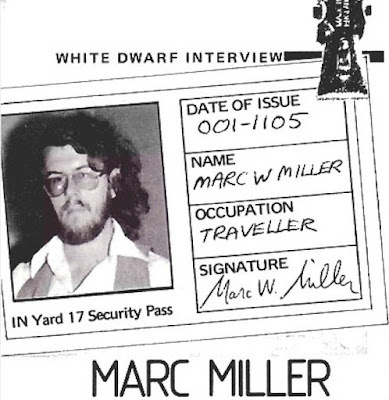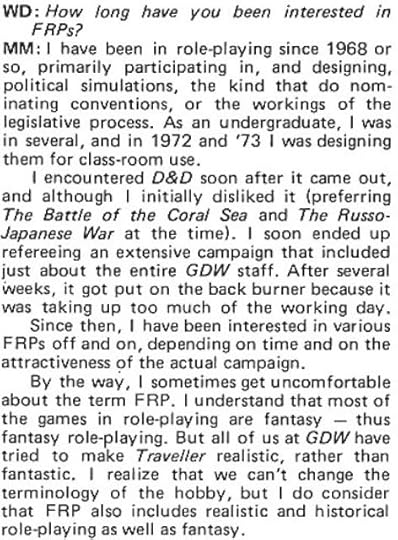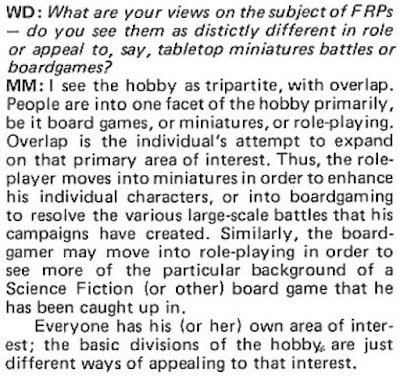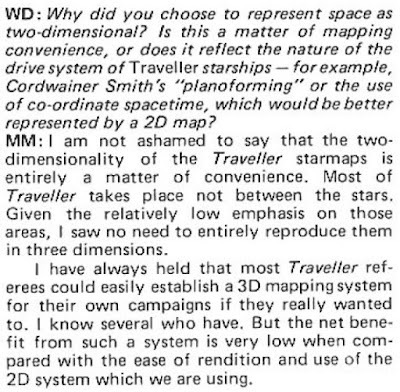White Dwarf Interviews Marc Miller
 Issue #23 of White Dwarf features a lengthy – and insightful – interview with the creator of Traveller, Marc Miller. I'm always interested in early interviews with foundational designers of the hobby. In this case, though, I'm especially interested, as Traveller is a game that's near and dear to my heart. The unnamed interviewer (Ian Livingstone?) asks a number of excellent questions and Miller's answers tell us a great deal about himself, GDW, and the origins of Traveller.
Issue #23 of White Dwarf features a lengthy – and insightful – interview with the creator of Traveller, Marc Miller. I'm always interested in early interviews with foundational designers of the hobby. In this case, though, I'm especially interested, as Traveller is a game that's near and dear to my heart. The unnamed interviewer (Ian Livingstone?) asks a number of excellent questions and Miller's answers tell us a great deal about himself, GDW, and the origins of Traveller.
 Miller's comment that he initially disliked D&D in intriguing, in light of the fact he (and Loren Wiseman) produced some of the earliest D&D-related comics in the pages of The Strategic Review. I also continue to boggle at the usage of "FRP" as shorthand for the hobby of roleplaying. It's not one I regularly encountered myself, but, based on what I've read, it was once quite widespread.
Miller's comment that he initially disliked D&D in intriguing, in light of the fact he (and Loren Wiseman) produced some of the earliest D&D-related comics in the pages of The Strategic Review. I also continue to boggle at the usage of "FRP" as shorthand for the hobby of roleplaying. It's not one I regularly encountered myself, but, based on what I've read, it was once quite widespread.
 This perspective was, I think, quite commonplace in first half-decade of the hobby, but became less so as time went on. Certainly by the mid-1980s, if not sooner, roleplaying's connections to miniatures or board wargaming were tenuous to the point of non-existence. That said, GDW seemed to be a company that tried to maintain the connections, as evidenced by its publication of both miniatures rules and board wargames to support Traveller, for example.
This perspective was, I think, quite commonplace in first half-decade of the hobby, but became less so as time went on. Certainly by the mid-1980s, if not sooner, roleplaying's connections to miniatures or board wargaming were tenuous to the point of non-existence. That said, GDW seemed to be a company that tried to maintain the connections, as evidenced by its publication of both miniatures rules and board wargames to support Traveller, for example.
 While there is lots of useful information here, I find the acknowledgement of D&D's influence the most important. Of course, the presentation of Traveller in the form of three digest-sized booklets revealed this already, but Miller's admission clinches the matter.
While there is lots of useful information here, I find the acknowledgement of D&D's influence the most important. Of course, the presentation of Traveller in the form of three digest-sized booklets revealed this already, but Miller's admission clinches the matter.
 This section of the interview is, for me, the single most important one. I've often encountered people who believe that Traveller was primarily inspired by cinematic science fiction. Miller certainly makes a concession to this possibility – "Movies and television particularly affected me." – but I think it's significant that all the direct influences he mentions are literary, from Anderson to Tubb to Niven and Pournelle. It's not an accident that, when pressed, the titles Miller rattles off are books, most of which were written in the two decades prior to Traveller's release.
This section of the interview is, for me, the single most important one. I've often encountered people who believe that Traveller was primarily inspired by cinematic science fiction. Miller certainly makes a concession to this possibility – "Movies and television particularly affected me." – but I think it's significant that all the direct influences he mentions are literary, from Anderson to Tubb to Niven and Pournelle. It's not an accident that, when pressed, the titles Miller rattles off are books, most of which were written in the two decades prior to Traveller's release. The interview, as I said, is quite lengthy and touches on a number of important topics regarding Traveller's design, such as why it has no levels or experience rules ("Most people in their real lives don't improve much as they live out their lives."), why many characters are middle-aged, and even why the game uses two six-sided dice ("Six-sided dice are ubiquitous; they are easily obtained, and most people are familiar with them."). Miller's answers are always interesting and, much as I'd like to share them all here, I don't want this post to go on interminably. However, I will include his answer to a longstanding criticism of Traveller, one that I think roleplayers have been making since 1977.
 And there you have it!
And there you have it!
Published on January 20, 2022 21:00
No comments have been added yet.
James Maliszewski's Blog
- James Maliszewski's profile
- 3 followers
James Maliszewski isn't a Goodreads Author
(yet),
but they
do have a blog,
so here are some recent posts imported from
their feed.



